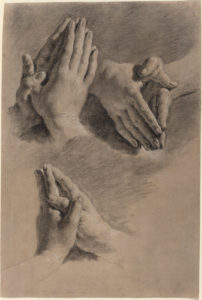
Jacopo Guarana (1720 – 1808 ), Three Studies of Hands Clasped in Prayer. Courtesy National Gallery of Art, Washington.
As Poor Clares, we are called to pray for the needs of others; this is our vocation and a sacred privilege.
Every day, we receive numerous prayer requests. They come via the Web, email, telephone, snail mail, and in person, and every one is shared with the sisters. Each one also becomes a precious slip of paper, even if it didn’t arrive in that format. It may sound old-fashioned to convert all prayer requests to paper, but these tangible signs of others’ needs, pains, and joy are meaningful. People reach out to us, often from a distance, and somehow, as our fingers touch and hold each slip of paper, it is as if we are holding their hands in prayer. The paper slips remind us of the temporal, physical dimensions of human life; each person is both body and spirit, and each prayer sustains our human and spiritual bonds with each other and with God.
We return to these prayer requests many times during the day. They are posted to a special board and placed in baskets near our chapel. In prayer, we take them with us as we enter our chapel for Mass, Adoration of the Blessed Sacrament, and the offices of the Liturgy of the Hours. In prayer, we take them with us as we leave the chapel and go about our work.
A friend recently asked me, “What it is like to receive so many requests for prayers? Don’t you get overwhelmed by hearing about all of the suffering in the world?”
Our hearts do break when we learn of others’ hardships, hurts, and needs. We weep with those who weep and grieve with those who grieve, just as we rejoice with those experiencing happier times (Rom. 12:15). Yes, there are more of the former. People are more inclined to contact us when they or their loved ones are hurting — physically or emotionally — seriously ill, facing a crisis, scared, confused, discouraged, or feeling alone. The volume and details of the requests are pressing, not overwhelming, however; we feel compassion, a sincere desire to accompany the requestors, through prayer, in their trials and hardships. As a community, we embrace them in and with love.
It is love that is our lasting response to each request, and it is love that is our lasting impression after we finish reading each day’s requests. We take to heart Jesus’s commandment that we love one another (John 13:34). We trust in God’s love for every human being. We know our love for all who ask for our prayers, and our love for those unknown to us.
What is overwhelming, and beautifully so, is the love that human beings have for each other: the grief of countless people who have lost loved ones; the love of a couple who yearn for a child; the love of parents when their children face difficulties of any kind; the love of a person who wants to be reconciled with another; the love of a spouse for a partner who is unemployed or in a stressful job; the love of someone whose family member or friend is battling cancer, addiction, or depression. There is great suffering; there is great pain. There is greater love.
We cannot underestimate the suffering in our world; pain — of any kind — can easily overwhelm and isolate the strongest individual. Prayer is unifying, however. It is communal. It is neither detached nor solitary. Prayer is not a magical string of words or gestures; it is, as Ruth Burrows says, “not a technique but a relationship,”1 with God and with each other. Intercessory prayer is fundamentally relational; we are companions (literally, those who eat bread together, from the Latin com + panis) of those in need, in communion with God. We join with Jesus, “who lives forever to make intercession for them” (Heb. 7:25), and with all the saints. It’s significant that the word “prayer” has two primary definitions: (1) the request or appeal itself and (2) the person (pray-er), the one who prays. The person becomes the prayer, and the prayer remains.
All tribulations, suffering, pain, and hardships will have an end. But love continues. Love is limitless. Love endures (1 Cor.13:13). So, too, each prayer endures, united with others in one vast continuum, enveloped in love, whose source, meaning, and completion is God.
1 Burrows, Ruth [Sr. Rachel of Quidenham Carmel], Our Father: Meditations on the Lord’s Prayer (Darton, Longman, & Todd, 1986) ,14.

